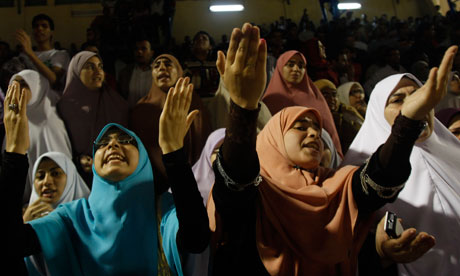Egypt's rulers tighten grip amid claims of election fraud and intimidation
• Governing party wins 96% of the vote in early results
• Official Egyptian opposition may be left with no seats
• Official Egyptian opposition may be left with no seats

Egypt's repressive regime sent a dramatic message to the international community over its determination to face down any challenge to its authority, after stage-managing parliamentary elections that virtually wiped out the formal opposition.
During the day, election-related violence claimed at least eight lives. Early results from the poll – described by domestic and international observers as "breathtaking" in its levels of fraud – suggest that the ruling National Democratic party (NDP) has captured 96% of the seats, while the 88 opposition members from the Muslim Brotherhood, could be erased to zero.Such clear evidence of rigging is likely to cause consternation in western capitals, from where there is strong pressure on President Hosni Mubarak to embrace some democratisation.
It will be viewed as a particular slap in the face for the Obama administration, which only last week had publicly pressed the Egyptian government to ensure these elections were credible.
"We are dismayed by reports of election-day interference and intimidation by security forces," said the state department, which provides more aid to Egypt than to any other country bar Israel. The Foreign Office also said it was "deeply concerned" by reports of state-sponsored disruption to the electoral process.
"We knew it was going to be bad, but I don't think anyone realised it was going to be this bad," said Shadi Hamid, director of research at the Brookings Institution thinktank and an analyst of Egyptian politics.
"Egypt has joined the ranks of the world's most autocratic countries. Now we're talking full-blown, unabashed dictatorship."
The parliamentary ballot was widely seen as a dry run for next year's presidential elections, when the 82-year-old Mubarak may be forced to step down.
Mubarak, who is believed to be seriously ill, has ruled the Arab world's most populous nation for almost three decades and has remained a close ally of the west, despite reports of systematic human rights abuses at the hands of his extensive security apparatus, and slow progress on political reform.
But with no designated successor, there is intense nervousness among Egypt's political elite about transferring power while public anger is growing over declining living standards amid the pervasive state oppression.
"These election results indicate that the regime is frightened about the impending transition, and they're not in the mood to take any chances over their own survival as we enter what will be one of the most challenging periods in Egypt's modern history," said Hamid.
"Previously, Egypt's level of political repression was never at the level of Syria, Tunisia or Iraq; it was always careful to retain some superficial democratic trappings. But now the government is sending a strong message that opposition will not be tolerated."
Sunday's vote took place amid a backdrop of widespread electoral violations that included ballot-stuffing, vote-buying, and the exclusion of opposition representatives, civil society monitors and journalists from polling stations.
In some towns riot police blocked voters from accessing polling booths. Eight people died in clashes across the day, with dozens more wounded.
Officials from the governing party rejected reports of wrongdoing in the poll.
"The NDP has done its best to ensure that the voting is clean and free from any irregularities," said Safwat el-Sherif, the party's secretary general.
But critics of the government disagreed. "The violence we saw was very much a controlled violence, where the authorities seemed to be in charge of what happened and when," said Joe Stork, deputy Middle East director of Human Rights Watch. A run-off vote in some constituencies will be held later this week.
Hamid said: "It's is really a sign that the ruling clique has no interest in appeasing the international community, and has calculated that the west will not provide the sort of vigorous response that you might expect a blatantly stolen election to provoke."Attention will now turn to the regime insiders jockeying for position to replace Mubarak, and the president's son, Gamal Mubarak, is in the lead. The former banker, and architect of many of the country's divisive, neoliberal, economic reforms, has long been groomed for the leadership.
However, he has recently run into opposition from the country's powerful armed forces who, concerned that a non-military figure could take over, want to retain a strong influence over the process of selecting Egypt's next ruler.
But, as the latest election has shown, there will be little opportunity for dissident voices to participate in that process.
"These elections were rigged and invalid," said Essam el-Arian, a spokesman for the Muslim Brotherhood.
"They are destroying any hope of the people for change by peaceful means."
